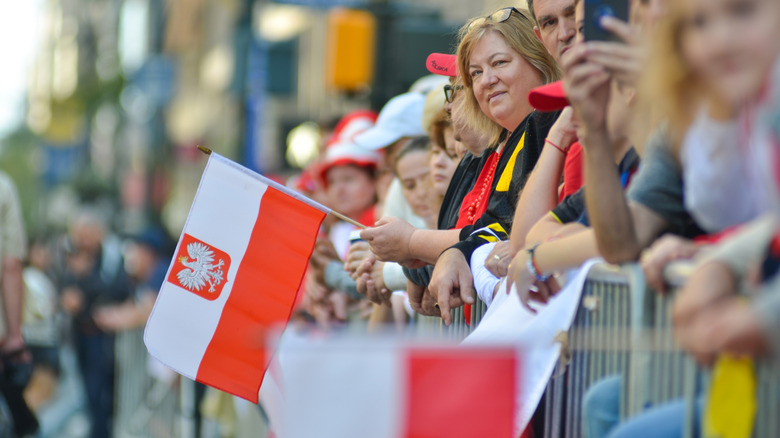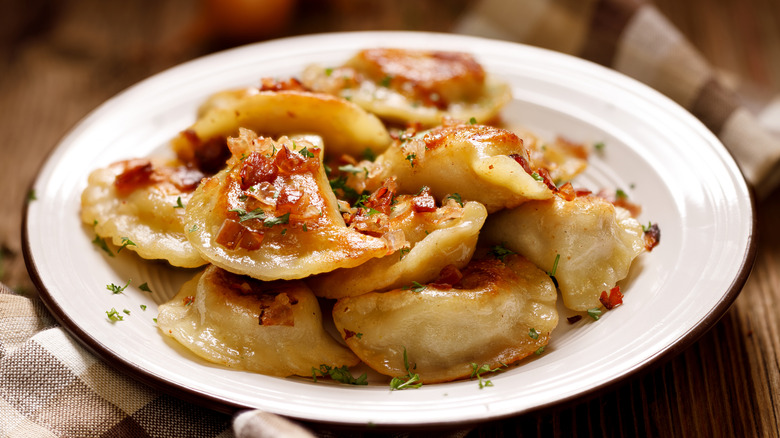Michigan's Yearly Polish Festival Is A Grand Rapids Charmer Full Of Food, Dancing, A Parade, And Pub Crawls
Pulaski Days is a beloved weeklong celebration of Polish heritage and one particular Polish American hero, Casimir Pulaski. Celebrated annually in early October throughout the venues and streets of Grand Rapids, Michigan, the 2025 festival runs September 28 through October 3. It features Bloody Mary bars, Polish sausages, pickle soups, parades, kielbasa-eating contests, golf, and a variety of other Polski traditions — including a Polka mass (yes — a Catholic service with a Polish spin). Essentially, it's a Polish pub crawl through social halls that are typically private — but not on Pulaski Days!
Grand Rapids, an artsy little city with mini-Chicago vibes, has the 18th-largest Polish-American population in the United States. Nearby Illinois has one of the largest, with Polish neighborhoods like Jefferson Park in Chicago. If you've spent time in the Great Lakes region, you'll likely recognize Casimir Pulaski, known as "The Soldier of Liberty" and "The Father of the American Cavalry." He even has an Illinois state holiday, observed the first Monday in March, when some government buildings and libraries close. He's also remembered in a song by indie-rock artist Sufjan Stevens.
Pulaski was a Polish military leader who fought Russian occupation in the late 1700s. After fleeing Austrian invaders, he met Benjamin Franklin in Paris and offered his services to the American Revolution. Franklin accepted. In America, Pulaski led successful attacks against the British, established the first U.S. cavalry, earned a brigadier general's rank, and is credited with saving George Washington's life. He was mortally wounded in 1779 in the Battle of Savannah, and in 2009, he became just the seventh foreigner to receive honorary U.S. Citizenship. Today, celebrating Pulaski is about more than honoring the war hero — it's about honoring the enduring pursuit of liberty and the rich immigrant heritage that Pulaski Days elevates.
You don't need to be a club member to visit Polish halls on Pulaski Days
In downtown Grand Rapids, 14 Polish and Lithuanian halls stand within a five-mile radius, hosting events and supporting the community year-round. Most allow anyone to join, though some require sponsorship. Pulaski Days opens the halls to the public, sparking lively debates over which serves the best food. "It was a great time," said Reddit user BourbonRick01, describing a past Pulaski Days experience. "We went down for the parade on Saturday at 11 a.m., then jumped from hall to hall over 8-9 hours. Most of the Halls are all walkable on the west side." Reddit user CrayolaColor, agreed. "Literally every day there's something. Tuesday is a pierogi eating contest, Wednesday is a kielbasa eating contest, Thursday is just Thirsty Thursday." Reddit user kole616 summed it up: "Everyone is Polish during that weekend. Go to a hall, get great Polish food, drink beer, dance to polka music with a stranger. It's honestly a ridiculously fun time!"
Polish halls started in the 1800s as Central Europeans settled across the Midwest. Many worked in furniture factories, brickyards, and other industries, forming tight-knit neighborhoods around Catholic churches. Hoping to preserve their heritage — and often expecting to return home — they founded mutual aid societies to help newcomers with language, jobs, even life insurance. The halls became safe spaces for politics, celebration, and tradition, and there was always Polish food, and polka music. One of the oldest in the U.S., Jackson Street Hall, still stands.
Pulaski Days is a great reason — but not the only reason — to visit Grand Rapids. Whether it's summer's Polish Harvest Festival or the Midwest's largest winter festival, the city is a surprisingly vibrant hub, much like the rest of the American melting pot.

